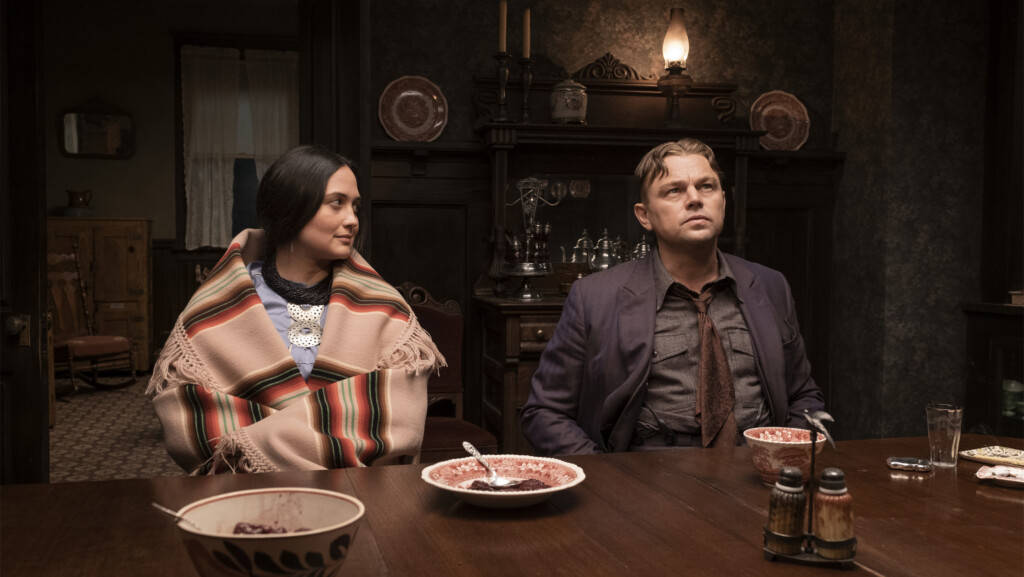Martin Scorsese is a director who needs no introduction to the masses, his crime epics redefied the genre, he helped make Leonardo Di Caprio the most beloved actor of his generation, but perhaps most crucially, he always manages to find the humanity at the heart of his movies.
With Killers Of The Flower Moon, Scorsese has rewritten the rulebook once again.
Leonardo Di Caprio stars as Ernest Burkhart, a World War 1 veteran who returns home to find a land transformed by the discovery of oil.
The grim spectre of unsolved murders of the local Osage tribe hangs over Oklahoma, soon Ernest finds himself in the middle of a twisty tale full of backstabbing, dirty work, and power struggles gone wrong.
Based on the non-fiction book of the same name by David Grann, the film smartly decides to make the story more about the Osage people at the heart of the story as opposed to the case serving as the formation of what is now known as the FBI.
Scorsese films always round themselves out with some incredible actors, and this is no exception with Robert De Niro in eclectic form as Di Caprio’s esteemed uncle King, but it is Lily Gladstone who walks away with the film, and indeed, will probably walk away with the Oscar next March.
There are very few greater thrills for a film fan when you see a movie star form in front of your very eyes, and the first time you see Lily Gladstone on screen, you cannot take your eyes off them.
Gladstone has had substantial supporting roles for Kelly Reichardt and a few episodes of Billions up until now, but this will be the film that catapults Gladstone to the A-list overnight.
Much like how Scorsese turned Margot Robbie into an instant superstar with Wolf Of Wall Street 10 years ago, Gladstone will most definitely have the same rocketship trajectory to the top of Hollywood.
Gladstone is effortlessly brilliant in scenes with Di Caprio and De Niro, you would swear they were a movie star all their life, and the movie sings when the focus is on her and Di Caprio.
Scorsese has never been afraid to let the characters breathe and flesh themselves out, his choice to focus more on character than world-building pays off here.
Reading the book or at least having a working knowledge of post-World War 1 American society would be advantageous for most viewers, but the film fully envelopes you in its world and never lets go.
Paramount has made an incredibly savvy decision to release this film in cinemas, and while the film will eventually wind up on their streaming service, it would be a shame to not see this film on the biggest screen you can find.
Fans of the beloved HBO series Deadwood will find a lot to love here, with sweeping landscape shots, busy street scenes and rich character work the order of the day here.
Heavy hitters such as John Lithgow and Brendan Fraser arrive on the scene with an hour to go, but the film changes at the 2-hour mark when Jesse Plemons’ character enters proceedings and the film turns into an analogue of the last act of Goodfellas.
Plemons, coming off an Oscar nomination for The Power Of The Dog and endless rewatches of Friday Night Lights, comes into the film to essentially spell as the harbinger of doom for Di Caprio and De Niro, and he fits effortlessly into the fold.
Scorsese is better than anyone at deploying dramatic irony in his films, and knowing that a character in the scene doesn’t know something but the audience does is one of the most simple but brilliant tricks used by the director here.
The screenplay, written by Scorsese and the incredibly underrated Eric Roth, is a masterful adaptation of the book, and even if you know how the story ends, you are left guessing right up until the final shot.
Roth won the Oscar for adapting Forest Gump, and in more recent times has been Oscar-nominated for Munich, A Star Is Born and Dune, and it is a shame that Roth isn’t recognised as the driving force behind those films.
While there are actual movie stars on screen, the people behind the camera like Roth, the late Robbie Robertson’s brilliant score, Rodrigo Prieto shooting the film and of course, the great Thelma Schoonmaker cutting the film together all combine to create this modern American epic.
The film is an examination of America’s uncomfortable relationship with the people who founded it to begin with.
In recent years, America has wrestled with its own past and how it treated the people who were there first, and Australia is currently in a heated debate surrounding the rights of Indigenous people, and this film is a timely reminder that these issues are not exclusive to the modern day.
In interviews for the film, Scorsese said if the film didn’t make people uncomfortable, there was no point in making it.
The film is often bleak, very demanding from an emotional perspective, and requires a decent amount of patience from the viewer, but it goes without saying the film richly rewards those who stick with it.
Films like Killers Of The Flower Moon don’t come around very often, and when they do, they need to be championed for the artform-defining masterpieces that they are.
